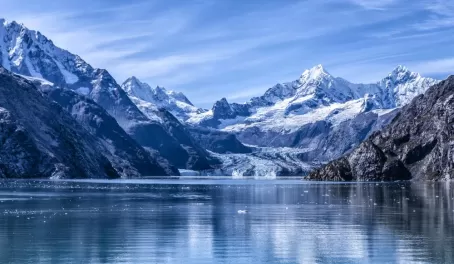Best Time to Take an Alaskan Cruise
The best time to take an Alaskan cruise is April through September with July and August being the highest season attracting the most travelers. Convention holds that the best months to cruise Alaska are July and August when the temperatures are at their highest and the weather is generally sunnier. However, the best time for Alaska cruises depends on your personal preferences. As all the locals know, the Alaskan weather is defined by its unpredictability, with sunny days turning suddenly stormy—and vice versa, so be prepared for all types of weather on your Alaskan cruise.
May and September have slightly cheaper fares for cruises, but that also comes with unpredictable weather that can cause your cruise to be canceled. It is considered one do the driest months of the year but you are still likely to find snow on the floor.
June, through August, are the hottest months of Summer. Although August is known for being much rainier. The farther into summer you visit Alaska the more rain you are likely to encounter, and the same applies to wildlife.
September is the best month to view the majestic Northern Lights. Although the waters tend to be the choppiest during this month, which can cause sea sickness to people prone to it.
Alaskan cruise weather, temperatures, and rainfall by month:
| Month |
Low |
High |
Rainfall |
| Jan |
20.7°F |
30.6°F |
4.8 inches |
| Feb |
23.5°F |
34.3°F |
4.0 inches |
| Mar |
27.8°F |
39.5°F |
3.5 inches |
| Apr |
33.4°F |
48.1°F |
3.0 inches |
| May |
40.1°F |
55.7°F |
3.5 inches |
| Jun |
46.1°F |
61.6°F |
3.3 inches |
| Jul |
49.2°F |
64.3°F |
4.1 inches |
| Aug |
48.3°F |
63.1°F |
5.4 inches |
| Sept |
43.8°F |
56.1°F |
7.5 inches |
| Oct |
37.7°F |
46.9°F |
8.3 inches |
| Nov |
28.9°F |
37.6°F |
5.4 inches |
| Dec |
24.4°F |
33.0°F |
5.4 inches |
Alaska Wildlife Viewing - Best Times of the Year
Summer may be prime travel time, but there are also advantages to taking an Alaska cruise during the shoulder seasons of May/June and September. Though the weather may be somewhat cooler and wetter, the tourist crowds are smaller, the mosquitoes fewer, and the daylight hours more regular, with no midnight sun to interfere with one’s sleeping patterns.
The spring months are prime for spotting moose (particularly in the Kenai Peninsula) and Dall sheep as they move down the slopes for better grazing, while September is ideal for sighting humpback whales, spawning salmon, and caribou migrating to their winter feeding grounds. July and August are also prime months in terms of wildlife viewing. Brown bears come out to fish along the rivers during these months, and moose can be seen feeding in lakes, ponds, and along rivers from spring throughout the summer. Also be on the lookout for seals and dolphins, which are easily seen from the deck of your ship. And of course, one cannot forget about the whales!
Fortunate travelers may have the chance to see beluga whales or even one of the three pods of orcas that frequent Alaskan waters in the summer. Then there are the one thousand humpback whales that spend their summer feeding in southeast Alaska, and those on a cruise in July or August have a good chance of seeing them as they traverse Frederick Sound. As summer shifts to fall, some of these massive beauties stop in the waters near Sitka to build up their food reserves before heading south to the tropics.
Alaska has it all: glaciers, wilderness, whales, wolves, forests, rivers, eagles, and mountains, all combining to create a stunning experience for those on an Alaska cruise. Long days of sunlight and relative warmth make summer a perfect time to travel to America’s largest state.
Alaska Cruise Tips
The weather can be very unpredictable in Alaska, be ready for a blazing hot day only to turn into a rainstorm at six pm. The temperatures of the different destinations also vary on a large scale. The best way to approach this unpredictable weather is with multiple layers of clothes that can be taken off if too hot.
If you are seasick prone avoid starting your cruise in Seattle, Vancouver, or anywhere else than Alaska itself to prevent days of traveling through open waters. The Gulf of Alaska is also largely protected by the stretch of the Inside Passage, so for passengers that are very prone to seasickness, it is advised to take a cruise that goes through the Gulf.













